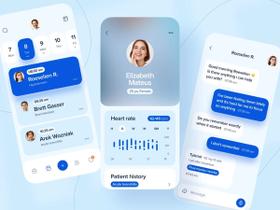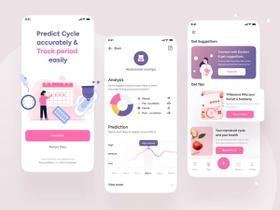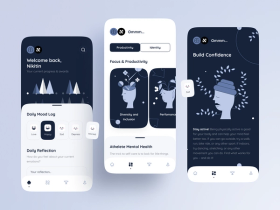Healthcare Mobile App Development: Comprehensive How-to Guide
Published: February 17, 2025
25 min read
In this article, you'll learn:
1
❓ How Healthcare Mobile App Development Can Help You Improve Your Business
2
✅ Types of Medical Apps
3
⚒️ 10 Steps to Develop a Successful Healthcare Mobile Application
4
🏃 Our Expertise in Healthcare App Development
5
⚙️ Healthcare Mobile App: Universal Features
6
📚 Legal Compliance & Privacy Policy
7
🤖 Tech Stack
8
💰 How Much Does Digital Healthcare App Development Cost?
9
💡 Takeaways
Nowadays, the healthcare industry is becoming more digitized at high speed. Every day, the market witnesses the emergence of more and more trends focused on healthcare app development.
According to Statista forecasts, in 2024, the revenue in the digital health market will reach $171.9 billion. The annual growth rate is projected to be 8.49% from 2024 to 2029, and by 2029, the market size is expected to be around $258.3 billion. The Average Revenue Per User (ARPU) is estimated to be $129.2.
Such demand is driven by the fact that mHealth solutions aren’t dependent on location & time so people can use such services wherever and whenever they want or need.
The same reason explains why you as a provider of Healthcare Products or Services might benefit from building a health app. You can reach a much wider audience and generate more revenue in less time since there’s no need to physically connect with your customers to provide services.
Not all healthcare apps succeed. Want to know what separates a thriving app from a failed one? This mobile medical app development guide breaks down the key features, compliance rules, and tech stacks you NEED to know!
❓ How Healthcare Mobile App Development Can Help You Improve Your Business
Having a mobile app can help healthcare providers improve their workflow & profitability in many ways.
The most obvious ones are reaching a wider audience, and getting rid of location limitations, language barriers, and other deterring factors. Similarly, medical insurance app development allows insurance providers to expand their reach, offering services to customers without geographical constraints.
So let’s take a look at advantages that don’t lie on the surface.
# 1: New Niche
The decision to start a medical app can change the world, as these apps aid in early cancer detection, stroke risk minimization, and improving life quality for those with chronic illnesses and rare diagnoses.
The medical industry still has a lot of slots for new heroes to enter the market with life-changing ideas since many diseases don’t have enough digital and remote resources to help people deal with them.
Once your idea hits the market, it’s likely to disrupt the industry and gain demand, paving the way for higher revenue and enabling you to build a highly scalable business.
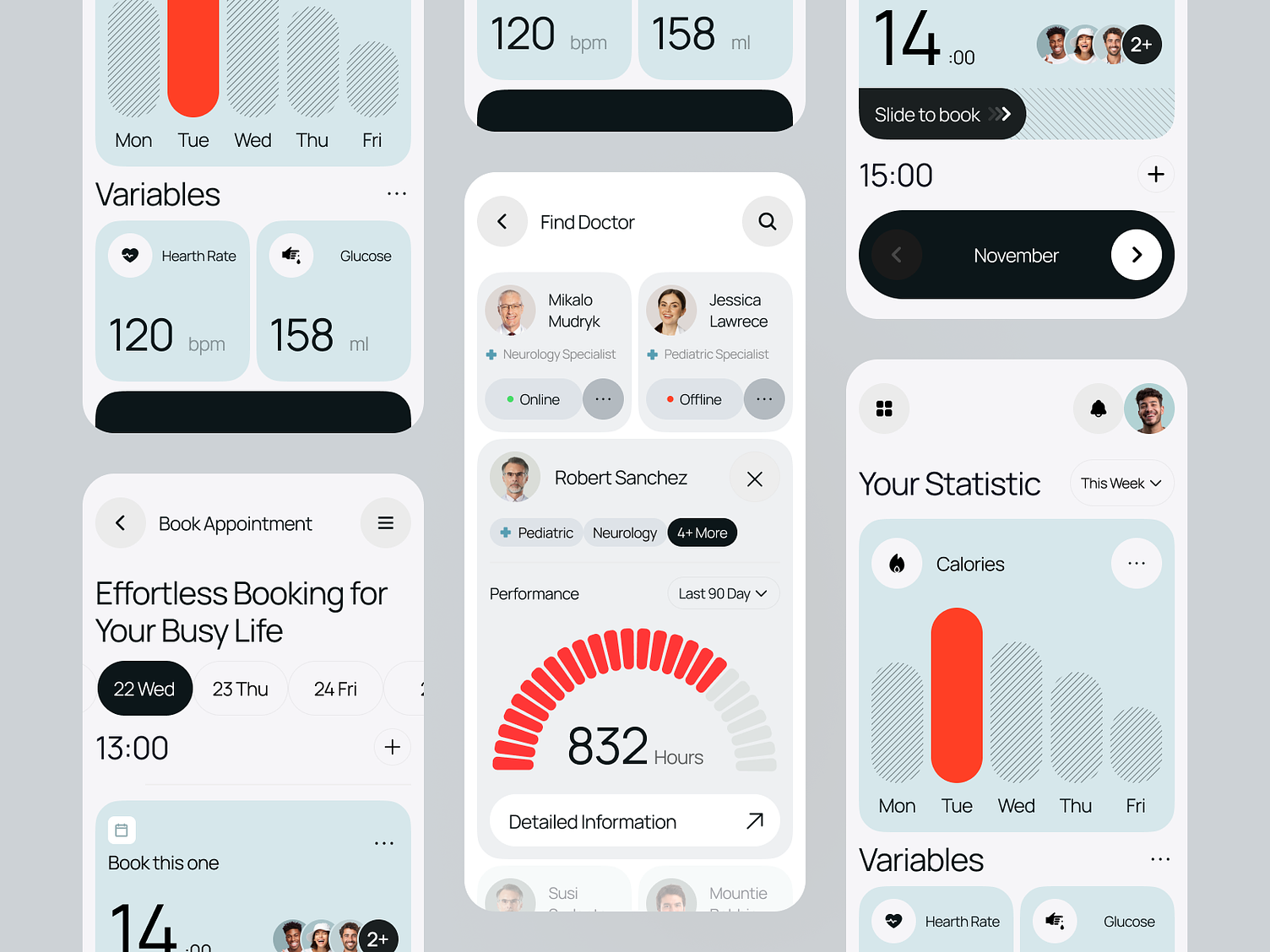
The rapidly growing mHealth market underscores the relevance of mobile medical application development (image by Royhan ®)
📌 In the same way, diet and nutrition app development can automate meal planning, grocery list creation, and dietary recommendations, making healthy eating more accessible and personalized for users.
# 2: Additional Functionality
It can happen that an existing health application doesn’t cover all of your potential cases.
Such a problem with limited app functionality is often relevant for businesses whose products are made with the help of different “out-of-the-box” mobile health and fitness app development services like Fliplet and Appy Pie that allow you to create a healthcare app by using a template.
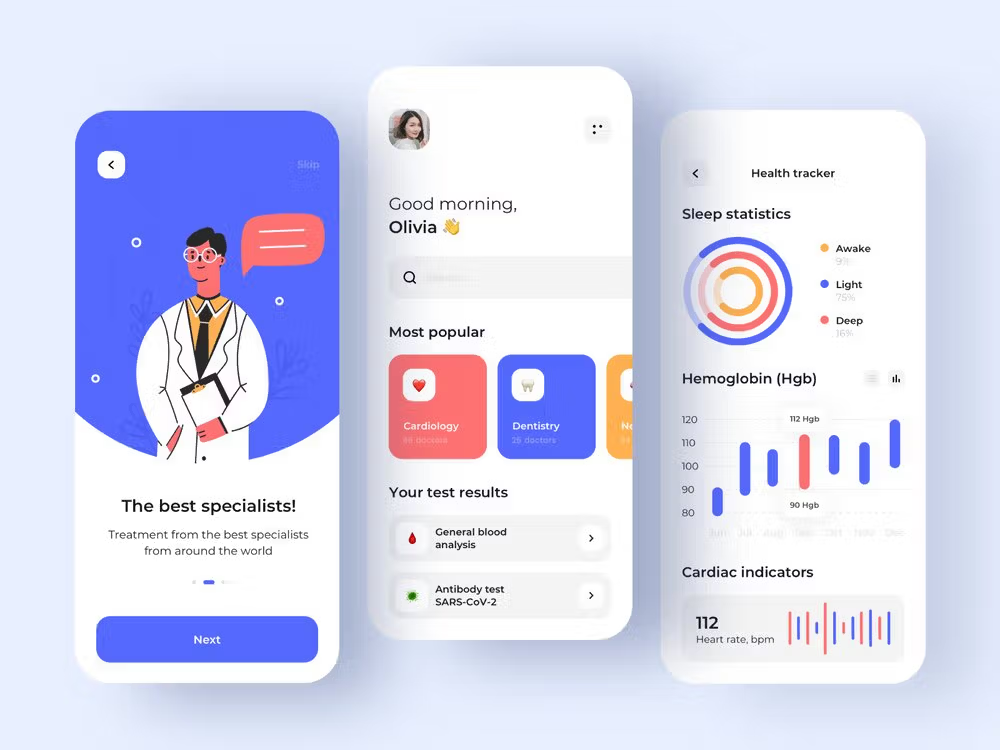
The process of building a health app plays a crucial role, as it enables the automation of many processes, significantly reducing the workload on medical staff (image by Anastasia Golovko)
Another reason why some businesses contact software development teams is that they want to add third-party integrations to an existing product. There are two main outcomes:
- If the current product allows integration with needed APIs or BLE devices (like fitness bands, heart rate trackers, etc.), the development team can easily do this.
- If the existing app can’t be modified with such integrations, your Technology Partner can suggest a solution to your case.
# 3: Workload Reduction
These days, booking an appointment with a physiotherapist can be quite challenging, often involving weeks of waiting. That’s why medical app development, such as physiotherapy app development, is critical to streamline processes and reduce doctors' workloads.

A healthcare custom app development can reduce the workload of doctors (image by Purrweb UI/UX Agency)
A mobile healthcare application development can help with workload reduction since many processes can be automated, and that reduces the workload on the medical staff.
Here are a few use cases demonstrating how such apps streamline processes like appointment scheduling, electronic prescriptions, and insurance claims while reducing workload:
- Instead of meeting patients in person to prescribe physiotherapeutic exercises, doctors can upload video instructions directly to the app or the user’s profile, saving time and effort.
- All prescriptions and recommendations, including electronic prescriptions, can be securely stored in the app, ensuring users can access the information anytime without needing to contact physicians.
- Apps can also simplify insurance claims by providing easy access to required documents and medical histories, making the process more efficient for both users and providers.
In terms of your profitability, digital healthcare app development can help you provide services to more clients in less time.
# 4: Constant Connection
From the medical point of view, it’s important to stay in touch with patients to have a more detailed overview of their well-being.
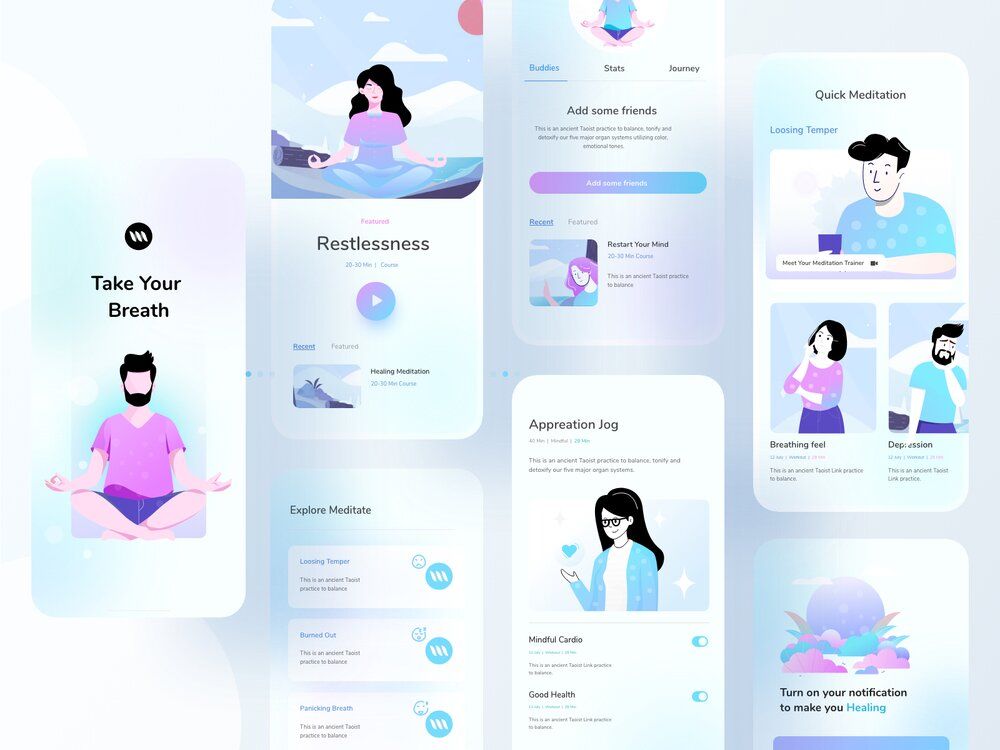
The healthcare custom software development is perfect for staying in touch with patients (image by Saikat Kumar)
Mastering how to build a healthcare app is key, as it empowers doctors to detect and prevent diseases at their early stages, so patients don’t come for a visit only when the situation gets critical.
This can be achieved through remote patient monitoring, photo "reports" from patients, symptom checkers, and other digital tools that enhance the diagnostic process.
Mobile health app development enhances services and workflow by addressing unmet medical needs, automating tasks, and enabling remote monitoring. These apps improve patient connection for early disease detection and management, offering a comprehensive solution for accessible, high-quality care while streamlining healthcare delivery.
✅ Types of Medical Apps
The healthcare sector is highly diverse, with numerous applications targeting different demographics, including starting a women's health tracking app and other healthcare industries.
Medical applications can be broadly categorized into four main types:
- Apps For Patients. Patient apps don’t require physician involvement but provide valuable health information. They help users track their health, set medication reminders, monitor symptoms, and manage wellness routines. A growing trend within this category is how to build apps for senior care, ensuring that elderly patients can access telehealth services.
- Apps For Providers. These apps are tailored to the needs of hospitals and clinics, improving management by streamlining workflows, staff coordination, and inventory tracking.
- Apps For Doctors. These applications serve as assistants to healthcare professionals, facilitating tasks like patient records, remote monitoring, diagnosis, and e-prescriptions.
- Apps For Appointment & Telehealth. These applications are often categorized under doctor appointment app development. They enable online consultations, simplify appointment scheduling, and provide remote healthcare access.
📌 Corporate fitness app development is another emerging area, focusing on creating apps that promote employee health and well-being within the corporate setting, offering companies a valuable tool to build a health app tailored to their workforce's needs.
If your idea requires unique insights into how to design and develop a healthcare app, feel free to reach out to us for specialized assistance.
Contact Us
Healthcare apps can vary greatly, combining several types or introducing something unique. The diversity in healthcare app types offers vast opportunities to build a medical app that meets specific healthcare needs — whether for patients, providers, doctors, or remote consultations. These apps enhance healthcare delivery, patient engagement, and overall medical management.
⚒️ 10 Steps to Develop a Successful Healthcare Mobile Application
If you're wondering how to build a health app, we have prepared a step-by-step plan for you. Where to start and what not to miss? Let's figure it out.
Step 1: Market Analysis and Understanding the Audience
Understanding industry trends, analyzing competitors, and assessing their strengths and weaknesses will give you valuable insights. Additionally, ensure that your MVP addresses real user needs and solves significant problems for your target audience.
Step 2: Defining the App Type and Features
Before starting digital health app development, you should define the type of healthcare app you want to create — whether it's for patients, healthcare providers, or both. Once you've established the target audience, outline the necessary features for your app. These may include appointment scheduling, telemedicine, medication tracking, health data monitoring, and secure communication channels.
📌 For wellness-focused apps, incorporating meditation mobile app development services can enhance user experience by providing relaxation exercises, mindfulness sessions, and stress-reduction programs.
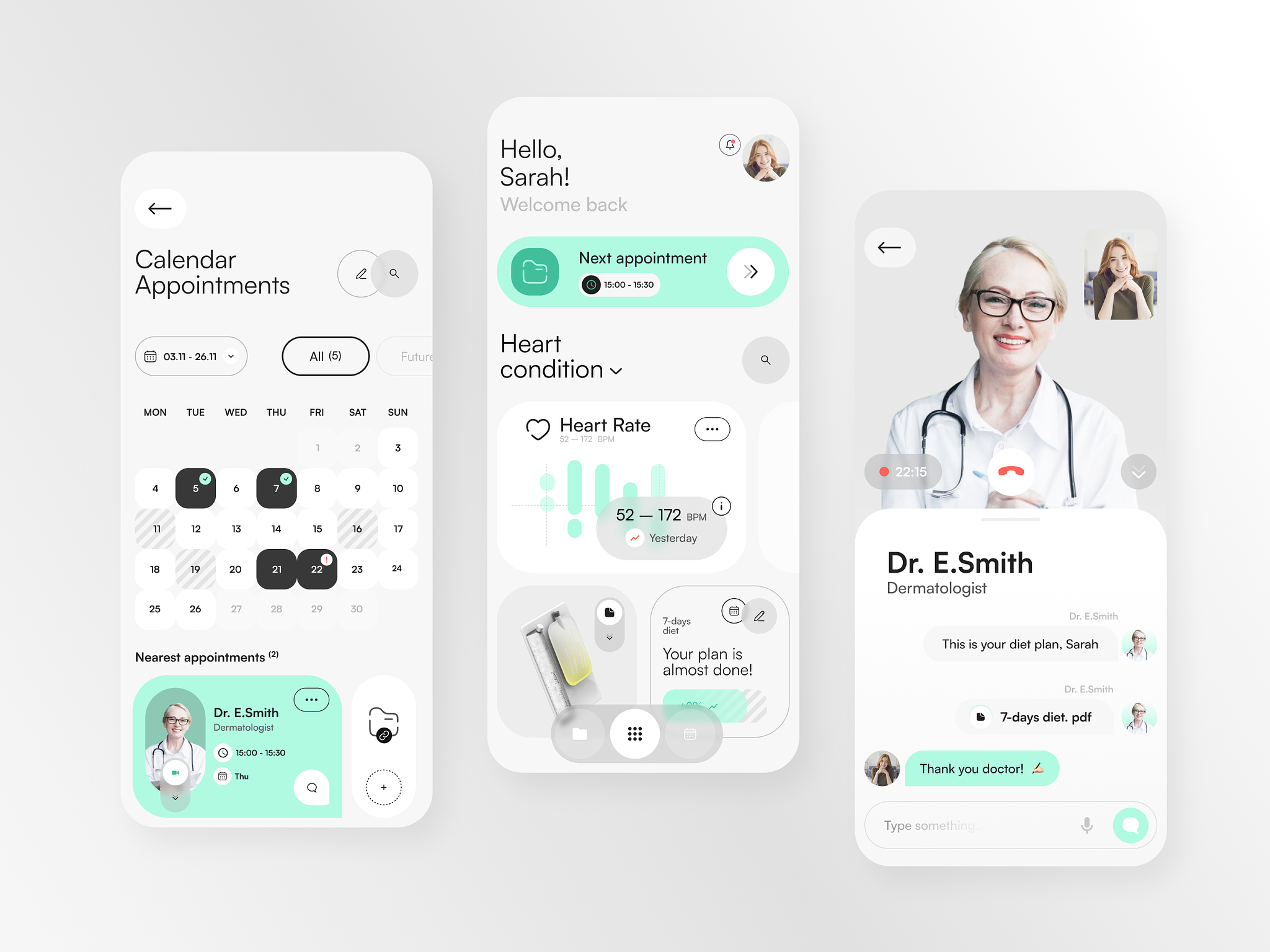
Implementing blockchain technology in a healthcare app ensures secure data protection and transparent management of patient record (image by Sam Halpert)
Step 3: Designing User Experience (UX) and User Interface (UI)
The focus should be on creating an intuitive UI and an effective UX design for both iOS and Android platforms. The UX should be simple yet functional, catering to the users' specific needs, while the UI should be engaging, offering a pleasant and easy-to-navigate experience.
Step 4: Ensuring Compliance and Security
When you develop a healthcare app, it’s essential to follow industry standards such as ISO 13485, ISO 27001, and ISO 27799, which focus on quality management, information security, and health data management, respectively.
Since healthcare applications handle sensitive personal health information, you should comply with HIPAA, GDPR, and PIPEDA regulations. Additionally, ensure robust data security measures, including data privacy, data encryption, secure user authentication, and privacy protection, to safeguard user information.
Step 5: Develop the App
In mobile healthcare application development, choosing the right technology stack is crucial for performance, scalability, and compatibility across platforms. Focus on building a robust frontend and backend that ensures smooth user experience and reliability and integration with existing health systems.
Step 6: Testing and Quality Assurance
Thoroughly evaluate the health tech app for functionality, usability, security, and compliance. This is an important step that involves identifying and resolving any bugs or issues before launching the application.
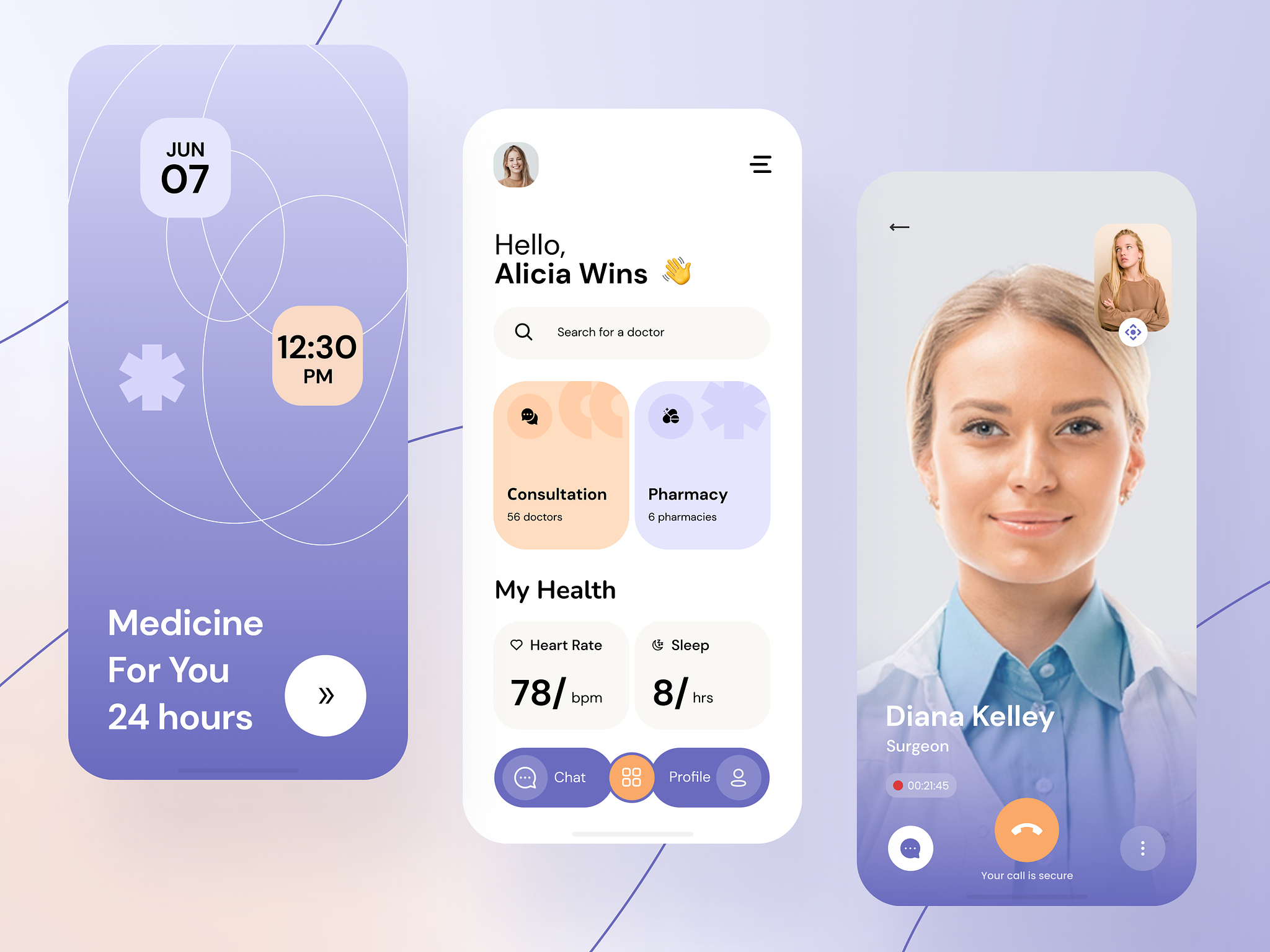
The healthcare software development process focuses on creating advanced solutions to improve the efficiency and quality of healthcare services (image by Anastasia Golovko)
Step 7: Launching the App and Marketing
Build a healthcare app, test it, and deploy it on the relevant platforms. Use a powerful marketing strategy to highlight the app's unique features for the target market when promoting it.
Step 8: Feedback and Continuous Improvement
Gather user data, check its effectiveness, and review app performance after launch. Analyze this information and use it to make the necessary improvements and updates to ensure the app is still relevant and helpful.
Step 9: Support and Maintenance
Continue providing support to address any user challenges and constantly update the app to fix bugs, enhance features, and ensure compliance with new laws.
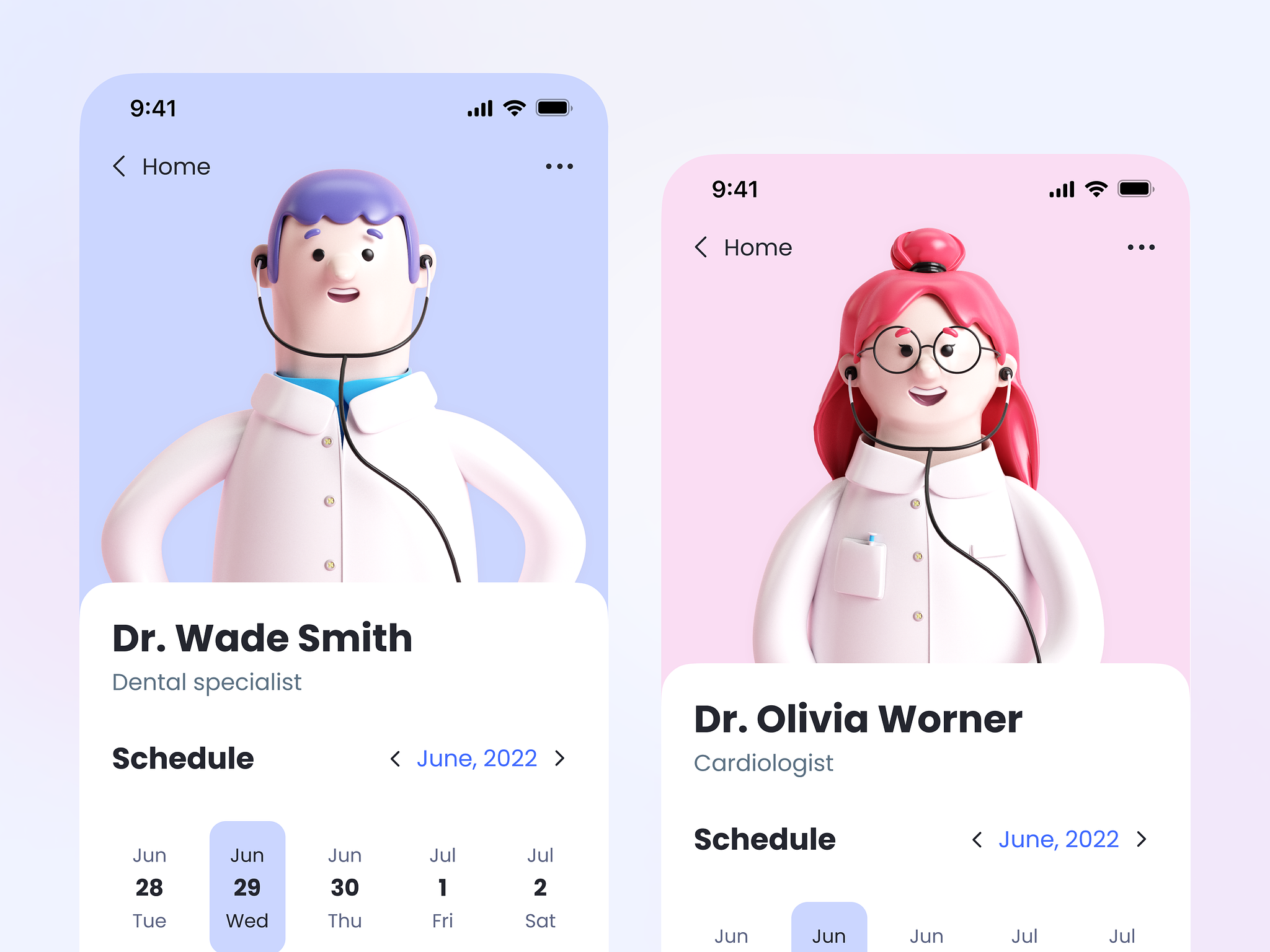
In healthcare software development, thorough debugging is crucial to ensure the accuracy and reliability of medical applications (image by Sigma Software Design)
Step 10: Scaling and Adding Advanced Features
As your app grows, think about expanding it to cater to more users and integrating sophisticated features such as AI-derived analysis, wearable device integration, personalized health tips, and seamless connectivity with health systems.
📌 By incorporating health and wellness app development, you can further enhance your platform with lifestyle coaching, stress-relief programs, and personalized fitness recommendations.
By following these steps and tailoring them to the unique needs of the healthcare sector, you can create a health app that is both viable and meets the needs of users.
🏃 Our Expertise in Healthcare App Development
In this section, we’ll review cases of our expertise in this field. Check out all our case studies in our portfolio.
Caspar Health
Caspar Health, a leading German digital rehabilitation company, offers personalized rehabilitation and aftercare solutions through a digital platform for medical facilities. As the demand for digital health services grew, they wanted to update their app to boost user engagement and improve rehabilitation outcomes.

The Сaspar Health app delivers effective and sustainable patient rehabilitation (image by Stormotion)
We began with a Discovery phase, analyzing the legacy software and legacy systems and working with Caspar Health to align new features with user needs. Our team used React Native Paper to design a healthcare app that meets accessibility standards. We also integrated TalkJS to meet security requirements while maintaining Sendbird for certain clinics. The updated app includes a rehabilitation progress tracker, allowing users to monitor exercise plans and daily progress.
The updated app led to a 4.7-star rating on Google Play and over 500,000 active patient accounts. With over 10 successful releases, we continue to refine and improve the app’s functionality.
LifeBonus
LifeBonus is designed to ease the burden on caregivers by providing efficient tools for managing elderly care while promoting their well-being. As the elderly population grows in the EU, LifeBonus combines AI-driven exercise tracking, certified care advisor guidance, and stress-relief resources to improve caregiving efficiency.
LifeBonus needed a mobile app (for both iOS and Android smartphones) to streamline caregiver task management, improve their health, and ensure effective elderly care. To create a healthcare app, we used AWS Lambda for cloud scalability, Terraform for configuration management, and integrated Artificial Intelligence, namely Machine Learning Kit for exercise tracking. We also built an intuitive, accessible interface and implemented a flexible CMS for ongoing updates.

The LifeBonus app helps caregivers manage tasks, improve their health, and ensure quality care for the elderly (image by Stormotion)
With a 4.8-star rating on the App Store and a 4.2-star rating on Google Play, LifeBonus demonstrates the power of digital transformation in healthcare. It continues to evolve, providing caregivers with the tools they need to improve their quality of life while offering excellent care.
MoveYoo
Another project we worked on is MoveYoo — a German physiotherapy app enabling therapists to remotely prescribe exercises to their patients.
We had to build a health app from scratch, incorporating features like well-being check-ups, therapeutic exercises, and personalized plans created by doctors.
WePulse
One of the other projects is WePulse — a corporate well-being platform that’s intended to encourage employees to live healthier lives. We started working with them when our other client Humanoo, a German corporate health platform, acquired WePulse.
Their team asked us to proceed with the backend development for the mobile app. For health & fitness user data exchange, we’ve integrated 3 fitness services:
Now, they can get all necessary activity data without having to measure it on their own.
Humanoo Kids
The Humanoo Kids app was designed to help parents track their child's development, manage health-related events, and access expert advice on wellness and nutrition. The client approached us to learn how to develop a healthcare app featuring milestone tracking, vaccination management, and appointment scheduling, along with integration into Humanoo’s insurance services.

The Humanoo Kids app helps parents track their child's development, schedule important health-related events, and access expert advice (image by Stormotion)
Over the project, we developed a React Native app with TypeScript, Firebase, and GraphQL, offering personalized content, video recording for custom achievements, and seamless insurance integration. The intuitive interface ensured ease of use for parents.
FitTracks
We can also show you how to build a healthcare app, using our experience with FitTracks as an example — a fitness app offering audio-guided workouts for everyone, from absolute beginners to seasoned athletes.
The workouts of this health mobile app fully meet all World Health Organization recommendations, and each one is designed to last 8 weeks with a possibility of a 4-week extension. FitTracks helps people adjust their workout routines for different muscle groups, prevention purposes, and joint workouts.
All courses have detailed video and audio instructions, as well as written texts so you can get yourself acquainted with the needed info before the workout and feel more confident about its structure.

A fitness health app can be combined with healthcare mobile app development (image by Stormotion)
Moreover, FitTrack’s workout programs are recognized by the German government as prevention courses. For users, it means that they can request 100% reimbursement from their health insurance companies.
Feel Amazing
Our team has worked with Feel Amazing, which is a project of Ailsa Frank, a British hypnotherapist and motivational keynote speaker. It’s targeted at general mental health improvement & self-development.

We have expertise in healthcare app development for mental care (image by Stormotion)
Their team’s main goal is to help people overcome their bad habits and be a better version of themselves through audio & video courses, as well as live streams.
The app has many courses dedicated to various topics — from alcohol and nicotine addictions to women’s well-being. It helps people to fight their fears, improve relationships with their loved ones, gain confidence, and adopt healthy habits.
It’s also child-friendly since the content includes sensitive topics regarding alcohol and smoking, which we secured with security measures, such as the Child Lock feature that hides content with age restrictions.
If you’d like to learn more about how to create a health app, check our case study:
The beauty of custom healthtech app development is that you can tailor it to your specific needs. If your idea is technically feasible (which we can help you determine), we’d be happy to assist!
⚙️ Healthcare Mobile App: Universal Features
In this section, we’ll explore the features commonly found in various types of healthcare apps.
# 1: Sign Up & Profiles
For medical app development, this feature is essential, as healthcare apps must comply with stricter policies than many other applications.
Typically, general information like email, phone number, and name suffices, which can be collected either during or after registration.
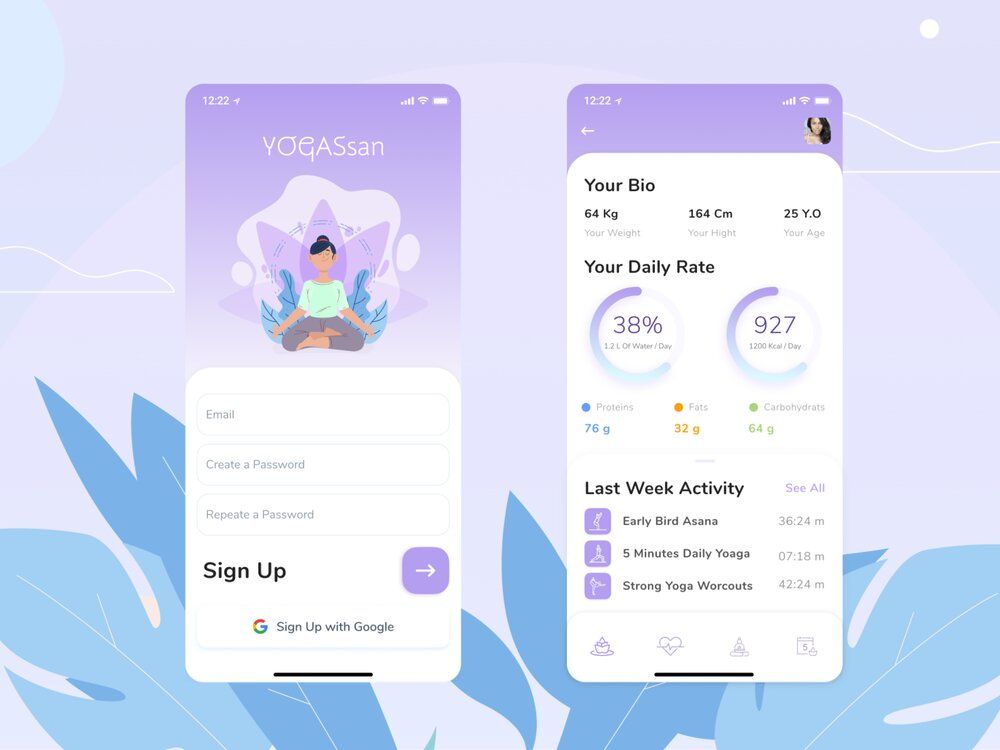
Sign-up and profile features are essential for healthcare app development (image by Tatiana Livinska)
However, healthcare apps might require additional details beyond the basics. For instance, users may need to provide specific health information when completing their medical profiles.
These profiles are often kept anonymous to comply with GDPR and HIPAA Security Rule requirements. Personal details are either stored securely within the app or managed by healthcare vendors and businesses without directly linking the information to an identifiable user. Incorporating essential features like two-factor authentication further enhances security and ensures sensitive data is protected.
# 2: Medical Profile
To create a medical app that provides personalized care and enhances patient management, you should include (or require, depending on its type) the option to fill out a detailed medical profile.
General information in the profile may include:
- Photo
- Sex
- Age
- Weight
- Height
- Insurance details (if you need it)
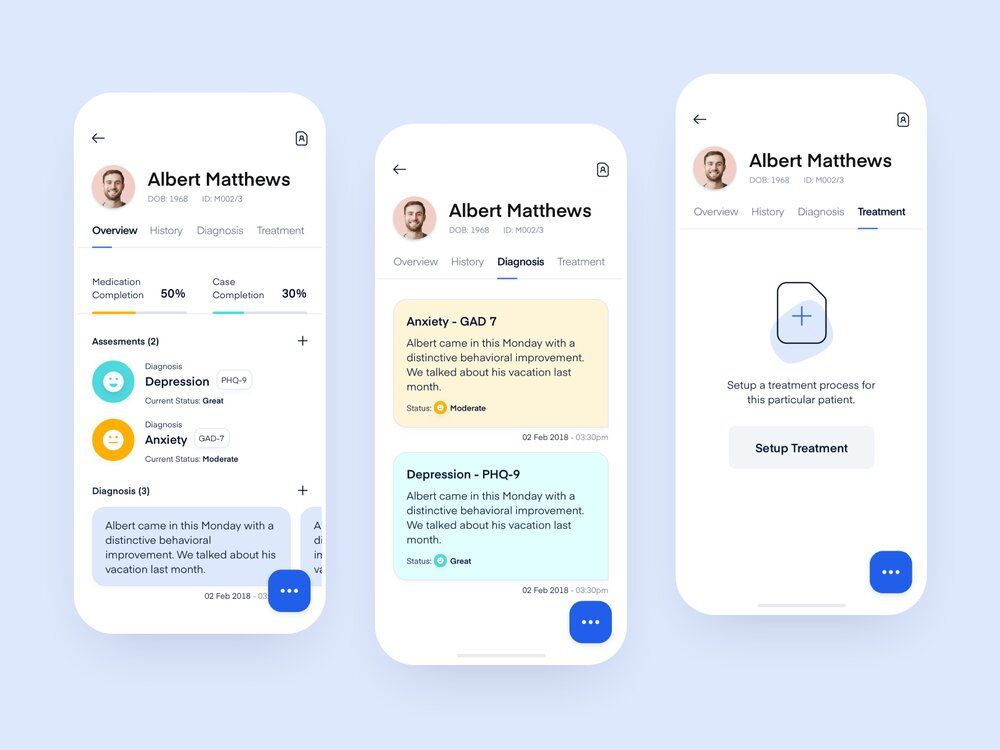
Remember to include a medical profile feature during healthcare app development (image by Filip Justić)
When building a health app, leveraging patient portals offers an excellent opportunity to collect and manage specific health details. Depending on the app's focus, the data requirements will vary. For example:
- A sleep-tracking app might display users' sleep schedules and ask targeted questions about their habits.
- A mental health app could inquire about disorders, anxiety levels, or emotional states.
📌 You can find out more about mental health app development in our guide!
For most healthcare apps, gathering details like chronic diseases, allergies, and medical history ensures the services are both safe and accurate, providing tailored support for users.
# 3: Chats with Doctors
Before we start talking about it, we’d like to point out that many types of healthcare apps don’t imply direct communication with doctors, making this feature irrelevant for those specific apps.
To enable patient-doctor communication and still reduce the doctors' workload, you can add chats, allowing patients to ask questions, and doctors can reply when they’re free, without being distracted from working with other patients. This is one of the key aspects of how to develop a healthcare app that balances convenience and efficiency.
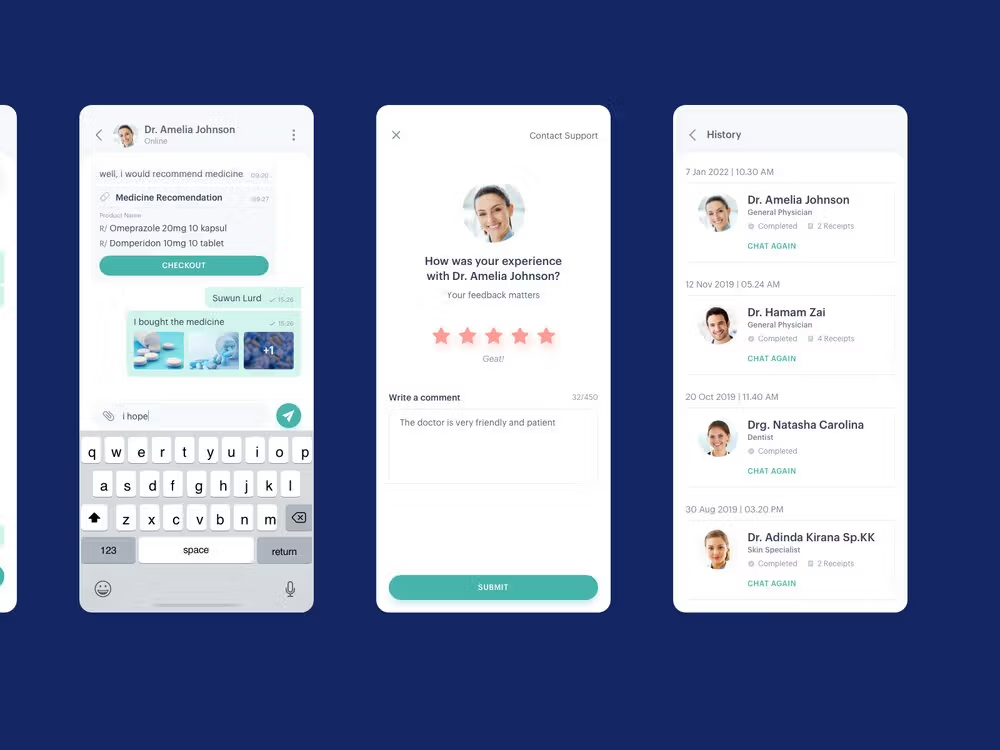
Think about adding a chat during healthcare software solutions development (image by hamam zai)
It might be a great idea to place an emergency button for cases when patients can’t wait and need a consultation as soon as possible.
# 4: Push-Notifications
Many healthcare apps use push notifications to remind users about daily activities, such as taking medications or birth control pills, completing well-being or symptom check-ups, and more.
This feature is versatile and can serve various purposes, including marketing. For instance, if you have a special offer, like a discount for a premium account, notifications are an excellent tool to inform users about such events.
# 5: Payment Gateway
In case you offer any in-app purchases or the app itself isn’t free, you might need to create a health app with a secure, reliable & user-friendly payment gateway.

It’s important to add a payment gateway during healthcare application development (image by Afshin T2Y ✪)
For a better user experience, the payment gateway should:
- Be consistent with different OS types.
- Use popular online payment methods like PayPal, Google & Apple Pay, a credit card, etc.
- Function fast with no delays.
- Provide strong protection of users’ data.
# 6: Customer Support
To help users figure out how to use certain features or deal with simple technical malfunctions, you can add user-oriented customer support.
When you make a healthcare app, a good customer support system typically includes:
- A chatbot that solves simple issues and escalates user requests to specialists.
- Live chat with support specialists.
- FAQ sections with a wide range of pre-answered questions.
- 24/7 phone support for emergencies.
- A list of contacts with mobile numbers for different operators, email addresses, and links to social media and messengers (like WhatsApp).
When you build a medical app, you should incorporate features that ensure user engagement, security, and accessibility. From sign-up and medical profiles to chats with doctors and push notifications, these features cater to the unique needs of healthcare apps. By integrating secure payment gateways and offering responsive customer support, you can enhance user experience while ensuring compliance with strict GDPR and HIPAA regulations.
📚 Legal Compliance & Privacy Policy
Healthcare apps handle sensitive personal data, and breaches can lead to legal consequences, fines, and harm to individuals. To ensure data security and prevent leaks, compliance with privacy and international standards is essential. Let’s explore some of the key regulations for mobile health app development.
Keep in mind that regulations may vary depending on your location, registration, and the citizenship of the individuals whose data you're handling.
# 1: GDPR
The General Data Protection Regulation is a privacy and security law in the European Union, applicable not only to businesses within the EU but also to anyone handling information related to EU citizens. When working with GDPR, it's crucial to understand what "personal data" includes, such as:
- Name;
- Phone number;
- Location;
- Identification number;
- Browser history;
- IP address;
- Other data tied to a user’s economic, social, mental, physical, physiological, or genetic identity.
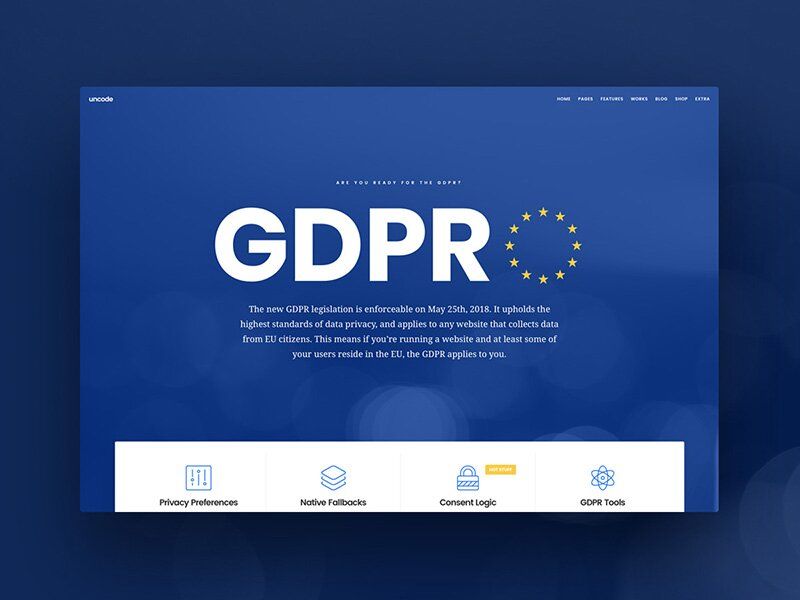
It’s essential to comply with privacy and security regulations (image by David Salvatori)
To ensure GDPR compliance when you develop a health app, you must meet six key requirements:
- Lawfulness, fairness, and transparency.
- Purpose limitation.
- Data minimization.
- Accuracy.
- Storage limitation.
- Integrity and confidentiality.
# 2: HIPAA
The Health Insurance Portability and Accountability Act is a US regulation that mandates healthcare institutions, businesses, and their associates to implement measures ensuring the security of patients' data at all stages — receiving, transferring, sharing, and handling it.
For how to create a health app that is HIPAA compliant, you'll need to adhere to specific rules on handling Protected Health Information (PHI), which include:
- Treatments.
- One’s past, present, or future mental/physical condition.
- Past, present, or future payment for healthcare received.
Additionally, a person’s identity must be verified using one or more of the 18 HIPAA-defined identifiers to ensure proper compliance with HIPAA privacy regulations.
# 3: PIPEDA
The Personal Information Protection And Electronic Documents Act is a Canadian privacy law that regulates the collection and use of personal data to protect individuals' privacy rights. PIPEDA covers a wide range of information, including names, ages, IP addresses, medical records, and employee files.
The principles of PIPEDA are similar to GDPR, emphasizing:
- Accountability.
- Purpose.
- Consent.
- Limitations.
- Duration.
- Accuracy.
- Protection.
- Transparency.
- Access.
- Challenge.
If you'd like to learn more about how to make your medical mobile app compliant with GDPR HIPAA, and PIPEDA regulations, be sure to check it out.
You must comply with key regulations like GDPR, HIPAA, and PIPEDA to ensure data privacy and security. These regulations are crucial in app development for healthcare to avoid legal issues and build user trust.
🤖 Tech Stack
To enhance the functionality of your medical mobile app, you can integrate various APIs and external resources:
- For calendar features, use APIs like Google Calendar, Nylas, or Zoho.
- For payment processing, Stripe or Braintree. We have a dedicated article about integrating payment systems, if you'd like to explore more on this topic.
- For push notifications, you can use APIs such as OneSignal or Pusher Beams.
- For chat functionality, consider APIs like Sendbird, Stream, or Vonage.
By integrating these APIs during the digital health app development process, startups can speed up development and reduce investment costs.
IoT, BLE & Healthcare App Development
Bluetooth Low Energy (aka Bluetooth LE, BLE) is a digital technology for data transferring, which implies low energy consumption and short range.
📌 This technology plays a crucial role in fitness applications as well, making it easier to build your own personal training app with real-time heart rate monitoring, workout tracking, and seamless integration with fitness wearables.
For consumers and providers, this technology is primarily recognized through the IoT devices that use it, such as:
- Wearables like fitness bands.
- Smart home devices and others.
Beyond these applications, IoT in healthcare leverages BLE to power devices such as wearable health monitors, connected inhalers, and smart insulin pens, enhancing patient care and remote health management.
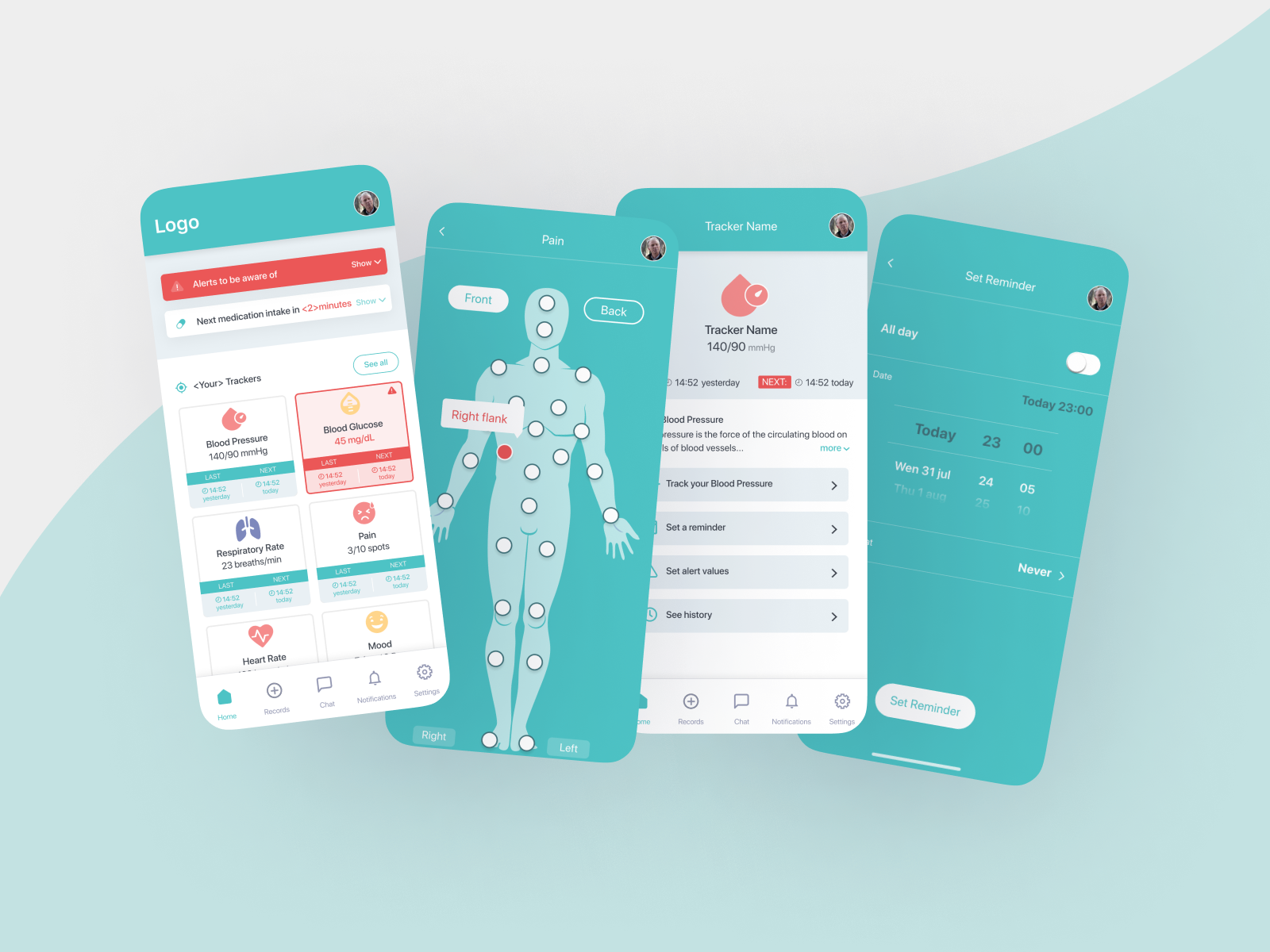
You can integrate your healthcare application with BLE devices (image by Florencia Yannuzzi)
Here are some use cases of how mobile healthcare software can leverage BLE integrations with medical devices:
- Fitness Trackers: Monitor heart rate, physical activity, sleep patterns, and more.
- Remote Healthcare Monitoring Systems (RHMS): Enable healthcare apps to collaborate with doctors for remotely tracking general health, chronic conditions, and more.
- Inner Body Sensors: Small sensors inserted into the body to detect early signs of dangerous diseases and alert doctors in emergencies.
For example, when learning how to create a medical app, you can read how our developers worked on integrating data transactions from cadence and heart rate sensors into the Platoon Fit app.
If you’d like to learn more about integrating BLE devices with a healthcare app development company, check out our article:
💰 How Much Does Digital Healthcare App Development Cost?
The cost of medical application development will significantly depend on the special features you choose and the healthcare industry you're operating in. Below is a rough estimation of the potential costs for digital healthcare features and development stages, estimated in hours.
⚙️ Feature | ⏳ Min Hours | ⏱ Max Hours |
|---|---|---|
🌍 Project Discovery | 60 | 132 |
🎨 UX/UI Design | 40 | 80 |
🔐 Sign Up Flow | 24 | 42 |
👤 Profile Management Flow | 18 | 36 |
💬 Chatting Flow | 32 | 48 |
🔔 Push Notifications | 40 | 64 |
💲 Payment Flow | 64 | 78 |
🎧 Customer Support | 18 | 28 |
💊 Medication Control | 80 | 96 |
🏃 Activity Tracking | 120 | 160 |
😴 Sleep Tracking | 90 | 120 |
👨⚕️ Exacerbation Control | 88 | 164 |
📑 Well-Being Check-Ups | 78 | 152 |
📝 Symptom Check-Ups | 48 | 82 |
📷 Camera Integration | 24 | 36 |
🍏 Nutrition Tracking | 88 | 164 |
🧘 Meditation Flow | 100 | 140 |
♀️ Period Tracker | 90 | 148 |
🤰 Pregnancy Control | 24 | 36 |
⌛ Birth Control Tracker | 24 | 36 |
🌐 Social Networking Elements | 15 | 66 |
💻 Admin Panel | 75 | 200 |
🤓 QA and Testing | 75 | 132 |
📱 Release | 16 | 24 |
📌 The cost of medical application development depends on factors like app type, features, and technology stack. For example, the cost to develop a healthcare app like Zocdoc can range from $45,500 to $97,500. The table above provides time estimates for specific features and development stages.
QA and testing will take at least 8% of the total development time. On average, development takes 700–1,500 hours, with a team cost of $50 per hour. Don't forget to account for the operational costs of a fitness app for a comprehensive estimate.
To sum up, the estimated cost of developing a health app ranges from $35,000 to $75,000, depending on the app's type, complexity, and functionality.
💡 Takeaways
As you can see, there are many types of healthcare applications, and each one is unique. Whatever healthcare services you want to provide, building a health app can help you achieve your goals.
Let’s briefly summarize the healthcare app development process:
- mHealth apps can improve your business in several ways: they allow for more advanced features, reduce the workload on medical staff, and help you stay connected with your users/patients 24/7.
- There are many types of digital mHealth apps, and their features can be combined to create mixed types. While the actual number of healthcare app types is much higher, the use cases tend to be more specific.
- Decide on the features you want to include in your application. Some features may be suitable for all types of healthcare apps, while others may be better suited for your specific needs. Make sure to educate yourself on the options first.
- Ensure that you determine the regulations you need to comply with to keep your business legal and secure.
- Find a tech partner and start the development! This step doesn’t necessarily have to come last — any development team would be happy to help you at any stage of the process.
If you need any help with medical app development or have unanswered questions, feel free to reach out to us. We’re here to help!
Our clients say
![Stormotion client Alexander Wolff, CPO from [object Object]](/static/a16ba3c9580effc3ab9a68d115eadffe/b0e74/alex.png)
When I was working with Stormotion, I forgot they were an external agency. They put such effort into my product it might as well have been their own. I’ve never worked with such a client-focused company before.
Alexander Wolff, CPO
Sjut
Was it helpful?
Questions you may have
Take a look at how we solve challenges to meet project requirements
Have you served clients in the medical and healthcare industry?
Our company has extensive experience in mobile healthcare application development. For example, the Caspar Health, LifeBonus, Humanoo Kids apps. You can find more details about the development of these applications in this article or by visiting the portfolio on our website.
How do you ensure healthcare app compliance with regulations like HIPAA and GDPR?
Of course, we ensure compliance with HIPAA rules, HITECH, FDA regulations, and other local legal requirements. This includes both international regulations and local laws to safeguard both the user and the product.
What measures are taken to protect patient data and privacy?
If specific measures aren't detailed, our compliance with HIPAA and GDPR demonstrates a strong focus on protecting patient data and privacy.
How is patient data secured against data breaches and cyber threats?
Stormotion implements robust patient data security measures to anonymize patient data as part of their compliance with HIPAA and GDPR.
What is your typical healthcare app development process?
We offer platform-agnostic development (iOS medical application development, Android medical app development, desktop, smartwatch, tablet) and technology consulting to ensure the app adapts to market changes while meeting your deadlines.
How are clients involved in decision-making during development?
We value client collaboration, so all key decisions are made in close consultation with clients. During custom app development for healthcare, our team maintains constant communication with the client to address and approve any issues quickly.
Can you provide an estimated timeline for our healthcare app project?
The timing depends on the app's complexity and functionality. For example, developing a healthcare app typically takes between 900 and 1,300 hours.
What key milestones and deliverables can we expect?
Key stages and results of mobile app development always depend on the specific project and client requests. In our work, we prefer to adhere to the Agile methodology: pre-project (discovery stage, planning); agile development (UX-prototyping, design, development, QA & testing); transition (maintenance, handover, next iteration).
Can you provide a breakdown of the project budget?
Costs depend on the app type and scope of work. Our health tech app developers provide rough estimates for specific types of apps based on the approximate time spent on development. Contact us with details about your project, and we will provide you with more precise figures.
What post-launch maintenance and support services do you offer?
We provide ongoing support, including bug fixes, SDK and API updates, OS updates, and the implementation of new features.
How are updates, bug fixes, and technical support handled?
We provide support for updates and technical issues by assessing, fixing, and testing changes before releasing them. We also monitor the system continuously, taking proactive measures to maintain reliability and performance.
Is the app designed to scale as our healthcare practice or business grows?
Yes, we offer technology consulting to ensure growth and adaptability, specifically designing a custom healthcare app that scales with the expansion of your medical practice or business. Our goal is to create a robust, scalable healthcare solution that can meet the evolving needs and increasing demands of your organization over time.
How does it accommodate increased user volumes and data?
To accommodate increased user volumes and big data in a medical app, we use scalable infrastructure (AWS, Azure, Google Cloud), caching mechanisms, and database optimization techniques. We also implement monitoring tools, analytics, and regular performance testing to ensure efficient handling of data and optimal performance.
Read also


